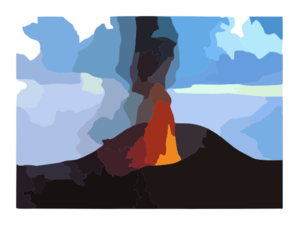Tags

In today’s news, Hekla seems to be rumbling again as reported by RÚV and others. Volcanoes are just a fact of life in Iceland, and people don’t seem to get too worked up about it. You do the best you can to prepare for it, and get out of the way when nature takes her inevitable course.
There’s a lot in this news story, and I ended up looking up many of the words, which I’m happy to share with you to save you some time 🙂 Let’s look at some of the more interesting phrases:
“…ekkert hafa komið fram sem bendi til þess að eldgos sé að hefjast”
“…nothing has happened to indicate that an eruption is beginning…”
benda til þess að comes up fairly frequently, from the verb að benda, which by itself just means to show or point something out:
| að benda – to show, point at | ||
|---|---|---|
| present | past | |
| ég | bendi | benti |
| þú | bendir | bentir |
| það | bendir | benti |
| við | bendum | bentum |
| þið | bendið | bentuð |
| þau | benda | bentu |
In the text it appears in the subjunctive form bendi.
“Hann segir að það sé tiltölulega nýtt fyrirbæri að svona mikið af skjálftum mælist við Heklu og yfir því liggja vísindamenn.”
“He says that it is a relatively new phenomenon for so many tremors to be measured at Hekla, and scientists are grappling with that.”
In this sentence liggja yfir stood out; liggja generally just means lie/stand, but with yfir + dative it expresses working hard at something.
The last paragraph:
“Víðir segir að einhverjir ferðamenn hafi verið í nágrenni við Heklu en ekki á fjallinu sjálfu. Hann varar við því að fólk gangi á fjallið eins og staðan sé núna. Hekla hefur gosið fjórum sinnum síðan 1970.”
“Víðir says that some tourists have been in the vicinity of Hekla but not on the mountain itself. He advises against people hiking on the mountain as things currently stand. Hekla has erupted four times since 1970.”
You could also translate eins og staðan sé núna as in the present situation I think.
There are a couple of conjugations of vara, the one that means warn as in this excerpt is:
| að vara – to warn | ||
|---|---|---|
| present | past | |
| ég | vara | varaði |
| þú | varar | varaðir |
| það | varar | varaði |
| við | vörum | vöruðum |
| þið | varið | vöruðuð |
| þau | vara | vöruðu |
Here we see it used as vara við + dative, to warn about something.
And a ton of vocabulary to help 🙂
jarð·skjálft/i m (-a,-ar) earthquake deildar·stjór/i m (-a,-ar) head of department almanna·varnir f pl civil defense koma fram appear, happen ben/da v (-ti,-t) show, indicate eld·gos n (-s,-) eruption hefja v (acc/gen) begin, commence tiltölu·lega adv relatively fyrir·bæri n (-s,-) phenomenon skjálft/i m (-a,-ar) shaking, tremor mæl/a v (acc) (-di,-t) measure, survey liggja yfir + dative work hard at, grapple with vísinda/maður m (-manns,-menn) scientist muna v (acc) remember við/vörun f (-vörunar,-varanir) warning skamm/ur adj (f skömm) short, brief fyrir·var/i m (-a, -ar) notice ráð/stöfun f measure ó·vissustig n (-s,-) level of uncertainty fyrst og fremst above all eftir·lit n (-s) observation, supervision sam·skipti n pl relations sam·starf n (-s) cooperation, collaboration aðil/i m party (in an issue)
The middle paragraph is probably the hardest, so take your time with it and have fun 🙂
